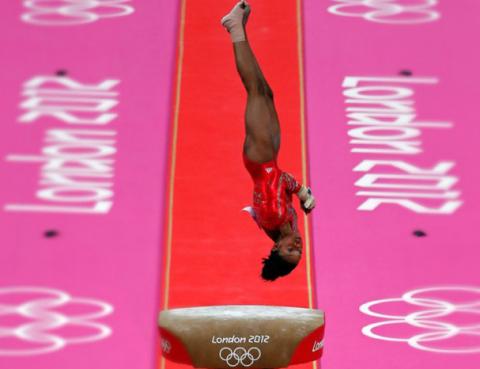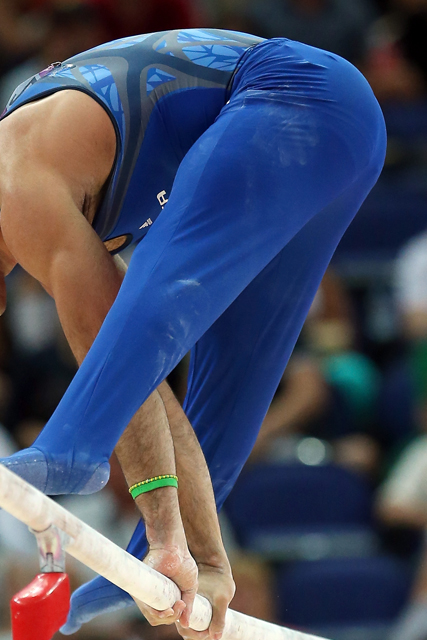The gender-equality Olympics: medals and penalties so far

The 2012 London Olympics have been heralded as the best Olympics yet for women, although gender inequalities remain, from sexist media commentary and gender-based bullying to less sponsorship and media coverage for female athletes than male athletes. Here, a gender score-card of the winners and losers so far. By Heather McRobie.
The 2012 London Olympics have been heralded as the best Olympics yet for women, the first time the games have had female athletes representing all the participating countries. As remarkable female athletes continue to set new world records, these games are a golden period for celebrating the successes of female athletes worldwide, many of whom have had to overcome significant challenges to take their place at the Olympics.
Still, predictably enough, though this is a period of appreciating the successes of sportswomen and pushing for further progress, still we find that sexism is continuing to hang around like an uninvited guest at the Olympics party. And, indeed, there have already been several noteworthy contenders for the Most Misogynistic Medal this year. First up is the debacle of the press coverage of women’s beach volleyball, heralded as the Olympics’ “sexiest sport” by breathless media outlets, which provided ample opportunity for female athletics to be treated as made-for-men pornography, with the mayor of London likening the “semi-naked” female competitors to “wet otters”, and a media treatment leading to the parody: “What if all sports were photographed like women’s beach volleyball?” 
What if all sports were photographed like women's beach volleyball?
Yet the exhibiting of female athletes primarily as passive fodder for the ‘male gaze’ continues through the Olympics like a retro parade (in Britain, after all, these are the times for retro parades, distracting the masses with stock pageantry, and arcane gender roles fit so neatly into the Jubilee-bunting adornments of the 2012 British summer). The sexist commentary runs the gamut from Australian newspapers bullying a female swimmer for “gaining weight” to sports commentators asking female Olympics gymnastics teams if they had “seen any diva moments yet”, the word ‘diva’ having obvious gendered connotations of hysterical women throwing tantrums, rather than professional, competitive athletes. Apart from gender stereotyping, another ongoing concern is whether they receive coverage at all: the Fair Game campaign to end sexism in sport notes that currently 5% of sports media coverage in the UK features women.
How sports commentators describe male and female successes is also key: in a report that brought back memories of the event last year in which Sky sports commentators Andy Gray and Richard Keys were caught on air making sexist remarks about lineswoman Sian Massey, a recent study of past Olympics coverage by American network NBC found that sports commentators spoke differently of sportspersons depending on their gender – namely that when female athletes succeed, commentators tend to focus on ‘luck’ more than when male athletes win, yet when female athletes fail it is more about their ability and commitment than when male athletes fail, while the male competitors’ success is more noted.
As always, the most disheartening examples are the undermining of women by other women, that most clever trick of patriarchy that comedian and ‘Mean Girls’ writer Tina Fey once called “girl on girl crime”: a case in point from last week was the overwhelming response on Twitter, mainly by women, to American gymnast Gabby Douglas, who became an Olympic gold medallist this year at 16 years old – the overwhelming response, that is, to how Gabby should wear her hair. The racial politics of hairstyles (that ‘straight’ Caucasian hair is still seen as professional and ‘neat’ whereas African-American hair is seen as ‘wild’ and ‘unkempt’) intersected grimly with women policing other women’s appearance and ‘attractiveness’ – hardly an activity that deserves an award – leading to Serena Williams to come to Douglas’s defence. Bullying a 16-year-old girl who has won an Olympic gold medal seems ridiculous, when you think how cruel and unnecessary it is to bully any 16-year-old girl. Yet female athletes being harassed by online trolling continues to be a serious problem that sportswomen perpetually - and should not have to - deal with: 23-year-old Olympic swimming competitor Rebecca Adlington, for instance, recently spoke out about the abuse she received about her appearance on Twitter. Adlington, unlike those who abuse her about her appearance online, now holds the title of Olympic bronze champion.
In fact, one of the clear developments of these ‘most gender equal yet’ Olympics – a sign of progress, even if it is a response to continued misogyny – is that female athletes have increasingly been speaking out about sexism, and putting their detractors firmly in their place. After winning a silver medal, cyclist Lizzie Armitstead used the media platform she was given to speak out about the “overwhelming sexism” that she has experienced throughout her career and still persists in sport, opening a discussion on how the media still “uses sex” to sell female sport to male spectators.
18-year-old Olympic weightlifter Zoe Smith also spoke out to slam down the sexist trolls (who presumably aren’t winning gold medals in anything) who responded to a BBC documentary on Zoe and her teammates by commenting online about how they didn’t find her attractive: “This may be shocking to you, but we actually would rather be attractive to people who aren’t closed-minded and ignorant… We, as any women with an ounce of self-confidence would, prefer our men to be confident enough in themselves to not feel emasculated by the fact that we aren’t weak and feeble,” she wrote.
With female athletes having to spend so much time dealing with this kind of abuse, it’s impressive they still manage to perform at the top of their game. Yet female athletes also face the disadvantage of less sponsorship than their male counterparts: a recent report commissioned by the Women’s Sport and Fitness Foundation found that only 0.5% of all commercial sports sponsorship goes to women’s sports while 61% goes to male sports (and the rest to sports in which both genders compete), an inequity Lizzie Armitstead has described as presenting a significant burden for female athletes.
So, a brief tally so far: unequal sponsorship, unequal media coverage, emphasising female athletes’ appearance over performance, speaking about their successes as ‘luck’, and calling young female Olympians “ugly” and “whales” – yep, there are a lot of Misogyny Medals to go round. And some sterling runners-up too: Japanese and Australian female soccer teams flying economy while their male counterparts fly first-class, the ‘Thanks Mom’ Olympics advert by Proctor and Gamble reinforcing regressive gender roles of women primarily of value as homemakers, hints of sexism (and racism) in the Ye Shiwen doping allegations, ESPN’s ‘Body Issue’ featuring US Olympians with the male athletes in active and ‘action’ poses and female athletes primarily in passive, ‘male gaze’ poses.
But at least there has been one new achievement: the amount of discussion about the need to increase support for female athletes, in terms of both coverage and sponsorship, and the significance of so many female athletes at the top of their game speaking out about – and saying they’re fed up with – the sexism they experience. Seeing women’s football on television as part of the Olympics may, for instance, finally increase its status after the Olympics end, while the successes of athletes such as Adlington and Armitstead will hopefully encourage more young women to participate in these sports. As female Olympians continue to win medals and break records, now is the time to also beat the broken-record of sexism in sport. {jathumbnailoff}
Originally published on OpenDemocracy. 
Image top (Gabby Douglas): On Being.
